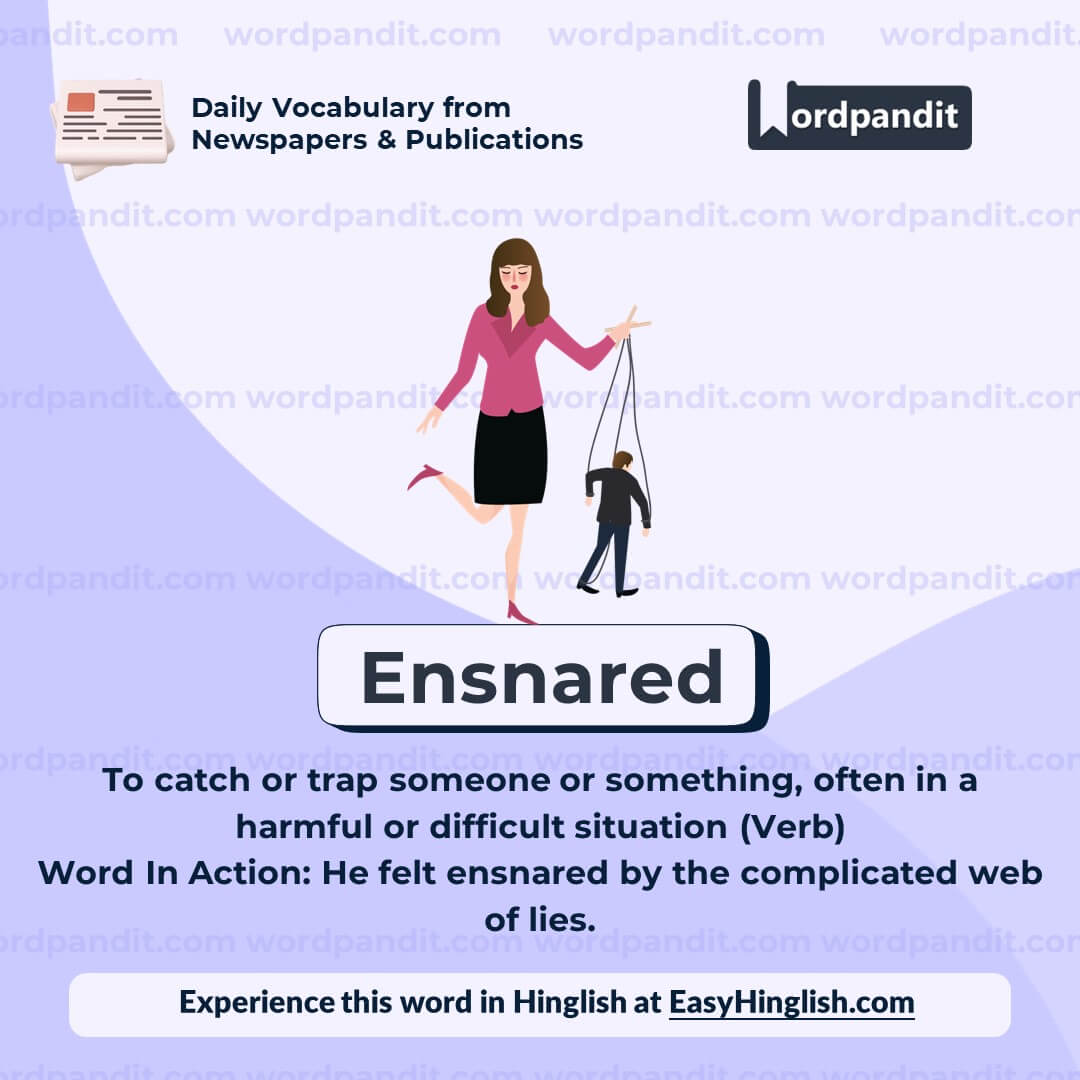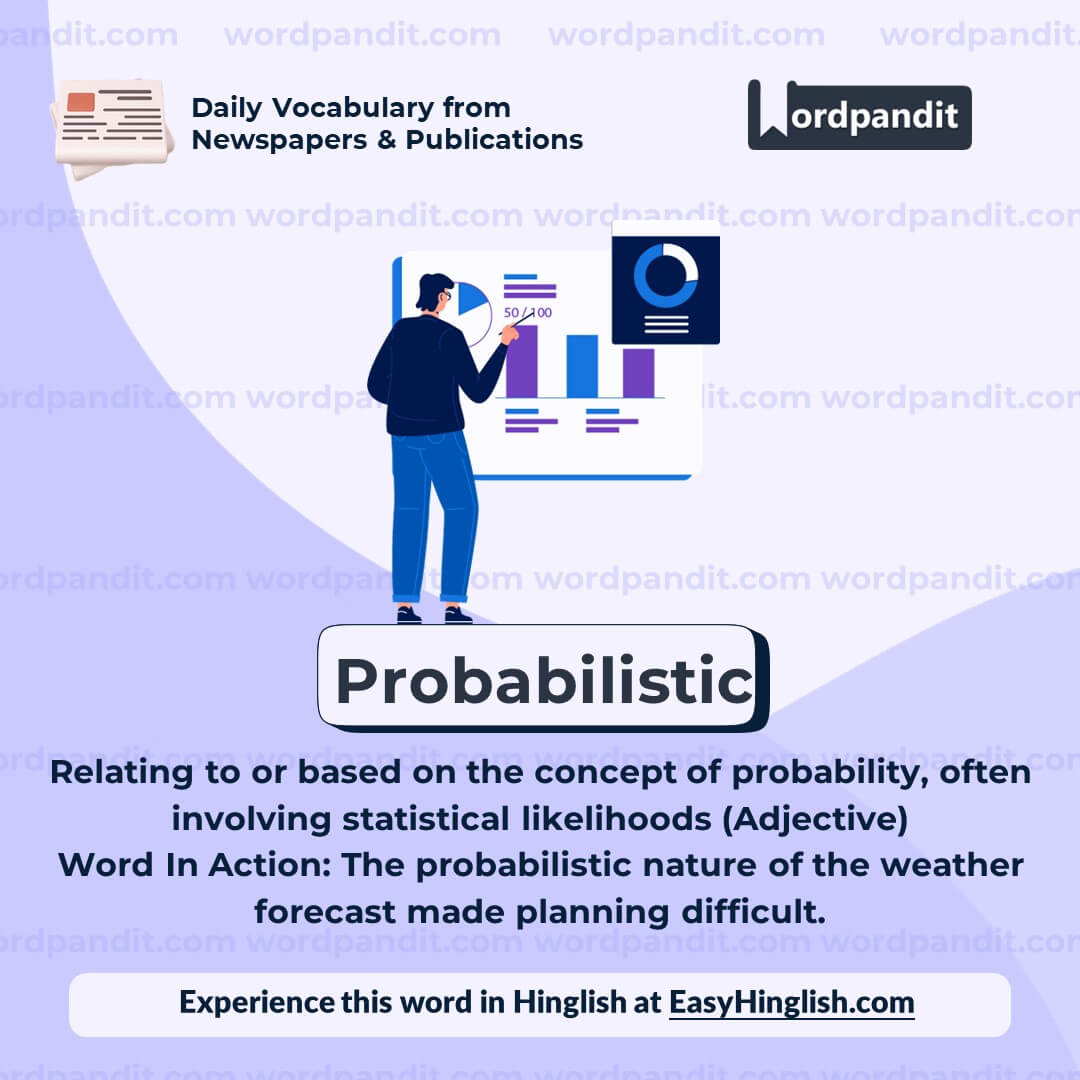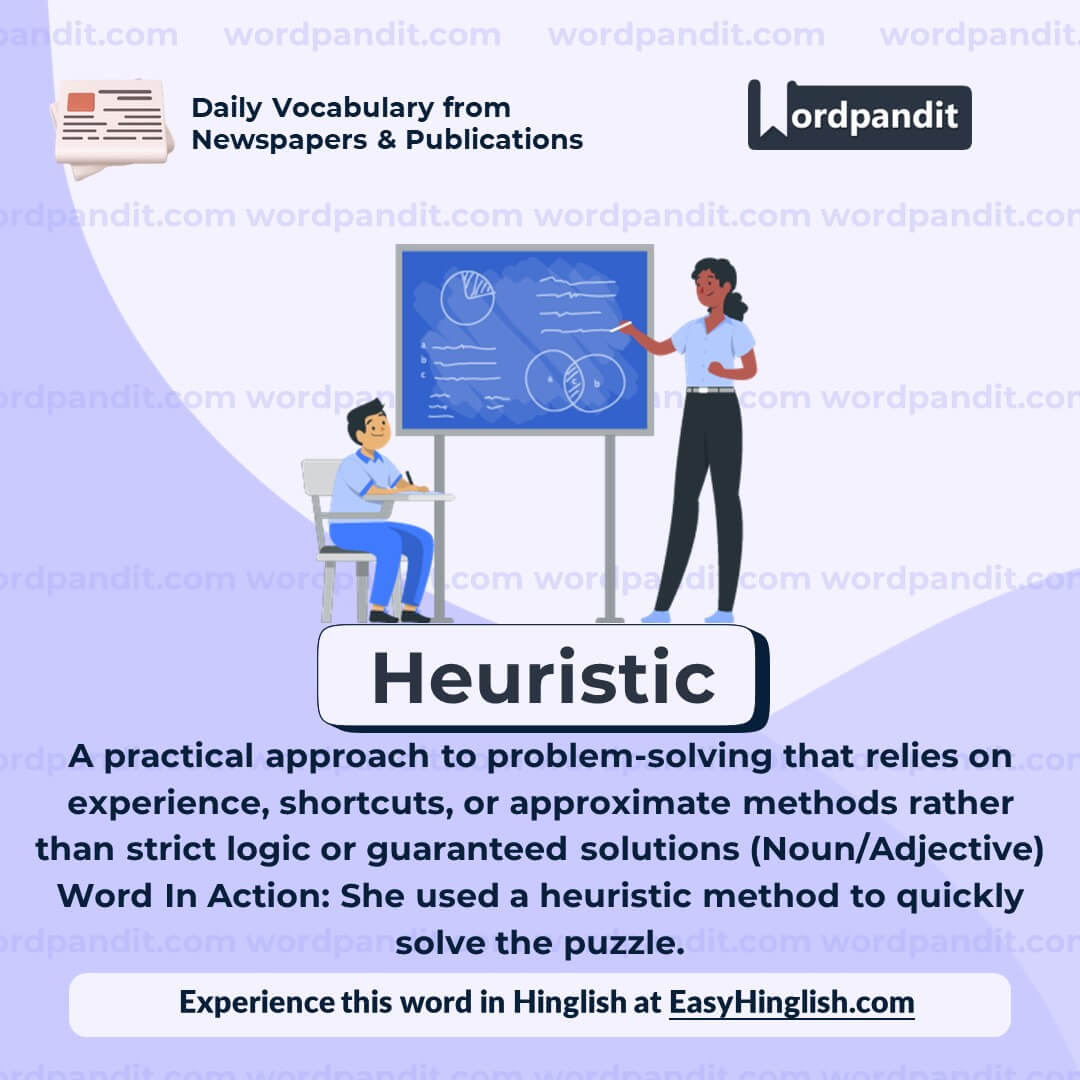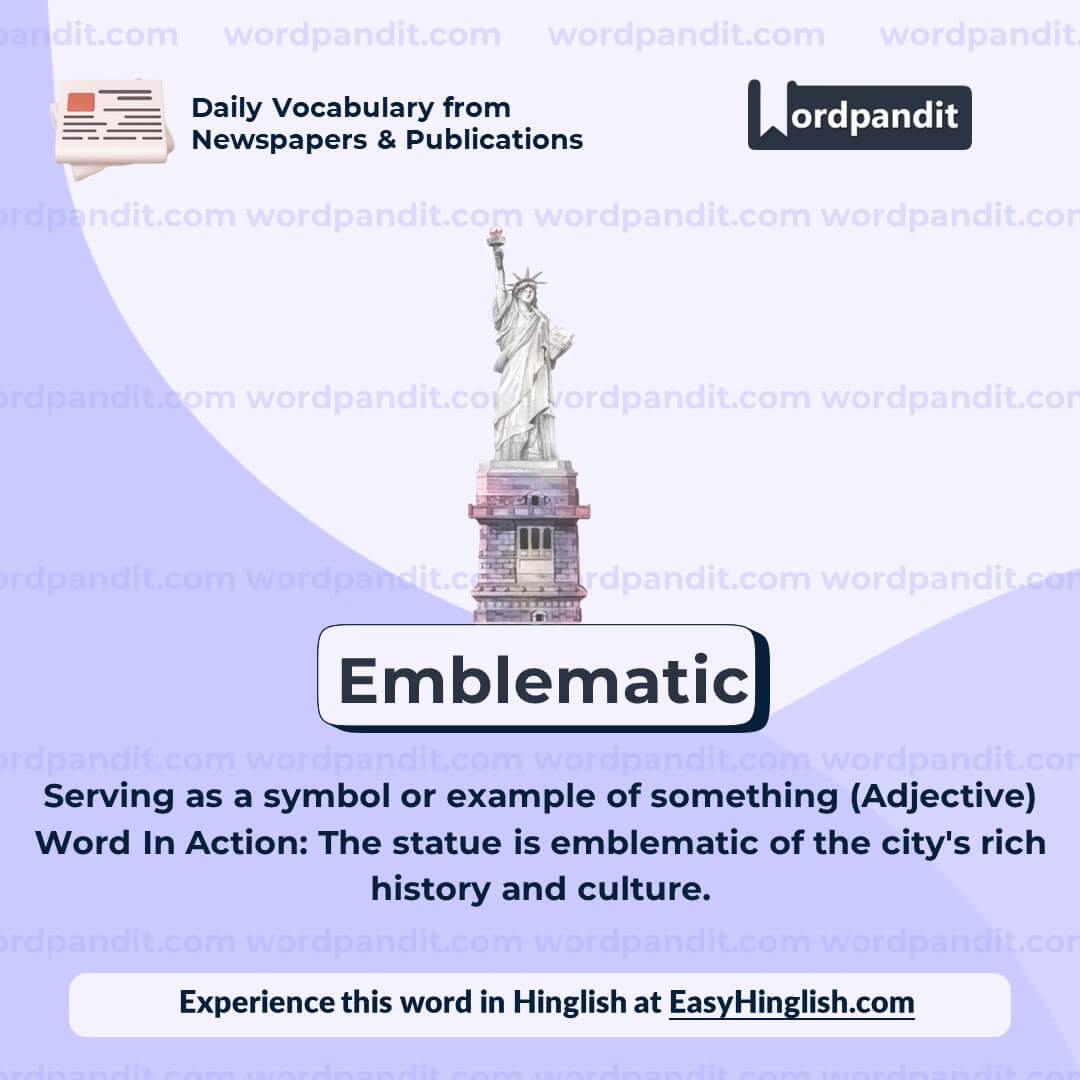Daily Vocabulary from Indian Newspapers and Publications
Welcome to Wordpandit’s Indian Vocabulary Hub
At Wordpandit, we understand the importance of staying rooted in the local context while expanding your language skills. This section focuses on enriching your vocabulary with words and phrases drawn from India’s leading newspapers and publications, ensuring you're learning vocabulary that is practical, relevant, and uniquely Indian.
Why Indian Sources Matter
We believe that the best way to master any language is by immersing yourself in local content. That’s why we carefully curate vocabulary from top Indian publications, including:
- The Hindu
- The Times of India
- The Economic Times
- Hindustan Times
- Live Mint
- The Indian Express
- And many others...
Stay Updated, Stay Relevant
With daily updates from Indian news sources, you’ll be consistently learning words that reflect the trends and shifts in Indian society and culture. Our focus is to provide vocabulary that enhances your understanding of the language in an Indian context.
How Wordpandit Supports Your Goals
Whether you’re preparing for exams, aiming to improve your professional communication, or simply want to stay connected with the latest Indian vocabulary, Wordpandit is here to guide you every step of the way.
Learn with a Practical Approach
Our interactive learning methodology includes real-world examples, engaging activities, and context-specific usage to ensure that every word becomes part of your active vocabulary.
Dive into Indian Vocabulary Today!
Why Choose Wordpandit?
Practical Learning: Focus on words you'll actually encounter in real-world reading, enhancing your comprehension and communication skills.
Diverse Content: From current affairs to scientific breakthroughs, our varied sources expose you to vocabulary across multiple domains.
Effortless Integration: Make Wordpandit a part of your daily routine. Just a few minutes each day can significantly boost your lexicon over time.
Your Path to Vocabulary Mastery
- Visit our Daily Vocabulary section regularly
- Explore new words and their usage in context
- Practice incorporating these words into your own writing and speech
- Track your progress as your vocabulary expands
Start Your Journey Today
Embark on your vocabulary enhancement journey with Wordpandit. By consistently engaging with our daily posts, you'll build a robust vocabulary that serves you well in academic, professional, and personal contexts.
Remember, a word a day keeps linguistic limitations at bay. Make Wordpandit your daily companion in the quest for vocabulary excellence!
WORD-1: Anticipate
Context:
"For many, the prospect of artificial general intelligence or AGI now seems more real, urgent and closer than anticipated." - The Wire
Explanatory Paragraph:
The word "anticipate" refers to the act of expecting or predicting something to happen. It involves preparing mentally or practically for a future event. In the context of the sentence, "anticipated" implies that people had a certain expectation about the timeline of AGI development, which now appears to be advancing faster than they foresaw.
Meaning: To expect or predict something to happen, or to act in advance of it. (Verb)
Pronunciation: an-TIS-uh-payt
Difficulty Level: ⭐⭐ Intermediate
Etymology: From Latin "anticipatus," the past participle of "anticipare," meaning to take (something) before it happens, derived from "anti-" (before) + "capere" (to take).
Synonyms & Antonyms:
Synonyms: Expect, foresee, predict, await, prepare for
Antonyms: Doubt, disregard, ignore, overlook
Usage Examples:
- The weather forecast allowed the city to anticipate heavy rainfall and prepare accordingly.
- She tried to anticipate every question the interviewer might ask during the job interview.
- The athletes anticipated the referee's whistle and sprang into action.
- Investors are anticipating the company's quarterly earnings report with great interest.
Cultural Reference:
"The ability to anticipate trends is a hallmark of successful innovation." - This idea has been widely discussed in business strategy, particularly in books like "Blue Ocean Strategy" that emphasize creating new market spaces.
Think About It:
How does anticipating an event influence your actions and emotions compared to reacting to it in the moment?
Quick Activity:
Think of an event or situation you expect to happen soon. Write down three ways you can prepare for it in advance using "anticipate" in your descriptions.
Memory Tip:
Link "anticipate" with "anticipation" by picturing a child eagerly waiting for a birthday gift. The excitement and preparation reflect anticipation and the act of anticipating.
Real-World Application:
"Anticipate" is commonly used in forecasting, project management, and strategic planning. For example, businesses often anticipate market demands or challenges to stay competitive.
WORD-2: Ensnared
Context:
"For over 14 months, the people of Gaza have endured unimaginable suffering, ensnared in what can only be described as a death trap." - The Wire
Explanatory Paragraph:
The word "ensnared" describes a situation where someone is trapped or caught, often in a difficult or inescapable position. It suggests being surrounded or held tightly, both literally, like in a physical trap, or figuratively, such as in a complex situation. In the context, "ensnared" conveys the plight of the people of Gaza who are stuck in severe and dire circumstances.
Meaning: To catch or trap someone or something, often in a harmful or difficult situation. (Verb)
Pronunciation: en-SNAIRD
Difficulty Level: ⭐⭐⭐ Advanced
Etymology: Derived from Middle English "snare," referring to a trap for catching animals, combined with the prefix "en-" meaning "to put in."
Synonyms & Antonyms:
Synonyms: Trapped, caught, entangled, imprisoned
Antonyms: Freed, released, liberated, rescued
Usage Examples:
- The hikers were ensnared in a dense thicket and struggled to find their way out.
- The suspect was ensnared by a clever police operation.
- Many young people become ensnared in the cycle of debt due to high-interest loans.
- The spider patiently waited as its prey became ensnared in the web.
Cultural Reference:
The concept of being "ensnared" is a common theme in literature, such as in Shakespeare's *Hamlet*, where characters often feel trapped by their circumstances, ambitions, or decisions.
Think About It:
What are some situations in modern life where people can feel ensnared, and how can they work toward escaping those traps?
Quick Activity:
Write a short story where a character becomes ensnared in a difficult situation and must think creatively to escape.
Memory Tip:
Visualize "ensnared" as being caught in a net, with no immediate way out. Think of "snare" as the trap and "en-" as being placed inside it.
Real-World Application:
"Ensnared" is often used in discussions of challenging or oppressive situations, such as legal troubles, financial difficulties, or societal systems that are hard to escape.
WORD-3: Probabilistic
Context:
"It was 'trained' on millions of examples of human text, constructing probabilistic 'rules' about which combinations of words are most likely." - The Wire
Explanatory Paragraph:
The word "probabilistic" relates to probability, referring to something that involves the likelihood or chance of an event occurring. In the context, it describes the process of creating rules based on the probabilities of word combinations appearing together in text, a fundamental concept in machine learning and natural language processing.
Meaning: Relating to or based on the concept of probability, often involving statistical likelihoods. (Adjective)
Pronunciation: prob-uh-buh-LIS-tik
Difficulty Level: ⭐⭐⭐ Advanced
Etymology: From the Latin "probabilis" (provable or credible), combined with the suffix "-istic," forming an adjective to describe probability-related concepts.
Synonyms & Antonyms:
Synonyms: Statistical, stochastic, likely, predictive
Antonyms: Deterministic, certain, absolute, definitive
Usage Examples:
- The weather forecast uses probabilistic models to predict the chance of rain.
- The outcome of the experiment is probabilistic, not deterministic, due to the random nature of particle behavior.
- Modern search engines rely on probabilistic algorithms to rank pages based on user queries.
- The probabilistic nature of the dice game makes it unpredictable yet fair.
Cultural Reference:
Probabilistic reasoning is a key concept in artificial intelligence, notably in Bayesian networks, which assess uncertainty in fields like medicine and economics. It has been popularized through works like Nate Silver's *The Signal and the Noise*.
Think About It:
How does adopting a probabilistic perspective help us make better decisions in situations of uncertainty?
Quick Activity:
List three everyday decisions where you subconsciously use probabilistic thinking (e.g., deciding whether to carry an umbrella).
Memory Tip:
Remember "probabilistic" by associating it with "probability" — imagine rolling dice to represent uncertain outcomes governed by chance.
Real-World Application:
"Probabilistic" methods are widely used in predictive analytics, finance, and artificial intelligence. For example, credit scoring models use probabilistic approaches to predict the likelihood of loan repayment.
WORD-4: Heuristic
Context:
"It would then choose the 'best' according to some loosely defined rule, or 'heuristic'." - The Wire
Explanatory Paragraph:
The word "heuristic" refers to a practical method or approach used to solve problems or make decisions. These methods are not guaranteed to be perfect or optimal but are often sufficient for achieving immediate goals. In the context, "heuristic" describes a rule or guideline used by an algorithm to determine the "best" choice in a given situation, even if the rule is loosely defined or not exhaustive.
Meaning: A practical approach to problem-solving that relies on experience, shortcuts, or approximate methods rather than strict logic or guaranteed solutions. (Noun/Adjective)
Pronunciation: hyoo-RIS-tik
Difficulty Level: ⭐⭐⭐ Advanced
Etymology: From the Greek word "heuriskein," meaning "to find or discover," and related to "Eureka," the exclamation of discovery.
Synonyms & Antonyms:
Synonyms: Shortcut, rule of thumb, trial-and-error, approximation
Antonyms: Algorithmic, systematic, exact, definitive
Usage Examples:
- Doctors often use heuristic methods to diagnose conditions based on symptoms and experience.
- The teacher provided a heuristic for solving quadratic equations quickly during the exam.
- Search engines rely on heuristic algorithms to deliver relevant results in real time.
- Heuristic approaches in game design help players learn through intuitive exploration.
Cultural Reference:
The term "heuristic" is widely used in artificial intelligence and computer science, particularly in problem-solving techniques like the A* search algorithm, which finds efficient paths using heuristic estimates of cost.
Think About It:
What are the advantages and limitations of using heuristic methods instead of strict rules in decision-making?
Quick Activity:
Identify a heuristic you use in daily life, such as estimating grocery costs while shopping, and explain why it works for you.
Memory Tip:
Associate "heuristic" with "Eureka moments" — discovering practical shortcuts or solutions, even if they aren’t perfect.
Real-World Application:
"Heuristic" methods are used in various fields like education, design, and AI. For instance, educators often employ heuristic techniques to simplify complex concepts for students, while designers use heuristics to create user-friendly interfaces.
WORD-5: Emblematic
Context:
"The chips are down, I rise up!” This statement, emblematic of Donald Trump’s defiant spirit, reflects the essence of his bold approach to politics and economics." - The Wire
Explanatory Paragraph:
The word "emblematic" refers to something that serves as a symbol or representation of a larger idea, characteristic, or quality. It often implies that the subject is a defining example or a clear indicator of something else. In the context, Trump’s statement is "emblematic" because it encapsulates his combative and bold persona in both politics and economics.
Meaning: Serving as a symbol or example of something. (Adjective)
Pronunciation: em-blem-A-tik
Difficulty Level: ⭐⭐ Intermediate
Etymology: From the Greek word "emblema," meaning "inlaid or mosaic," and the Latin "emblematicus," denoting something symbolic or representative.
Synonyms & Antonyms:
Synonyms: Symbolic, representative, indicative, archetypal
Antonyms: Atypical, uncharacteristic, unusual, irrelevant
Usage Examples:
- The Statue of Liberty is emblematic of freedom and democracy worldwide.
- Her resilience in the face of adversity is emblematic of her strong character.
- The roaring twenties are often seen as emblematic of economic prosperity and cultural change in the 20th century.
- The artist’s bold use of colors is emblematic of his unique style.
Cultural Reference:
Nelson Mandela is emblematic of the fight for justice and equality, symbolizing perseverance and the power of peaceful resistance during apartheid in South Africa.
Think About It:
What qualities or symbols do you think are emblematic of leadership in the modern world?
Quick Activity:
Identify a historical or cultural symbol that is emblematic of a specific era or movement, and explain its significance in a few sentences.
Memory Tip:
Link "emblematic" to "emblem" — picture an emblem on a flag, representing a nation or idea.
Real-World Application:
"Emblematic" is commonly used in political analysis, literature, and art criticism to highlight symbols that represent deeper themes or ideas. For example, a politician's catchphrase can be emblematic of their overall strategy or philosophy.


















